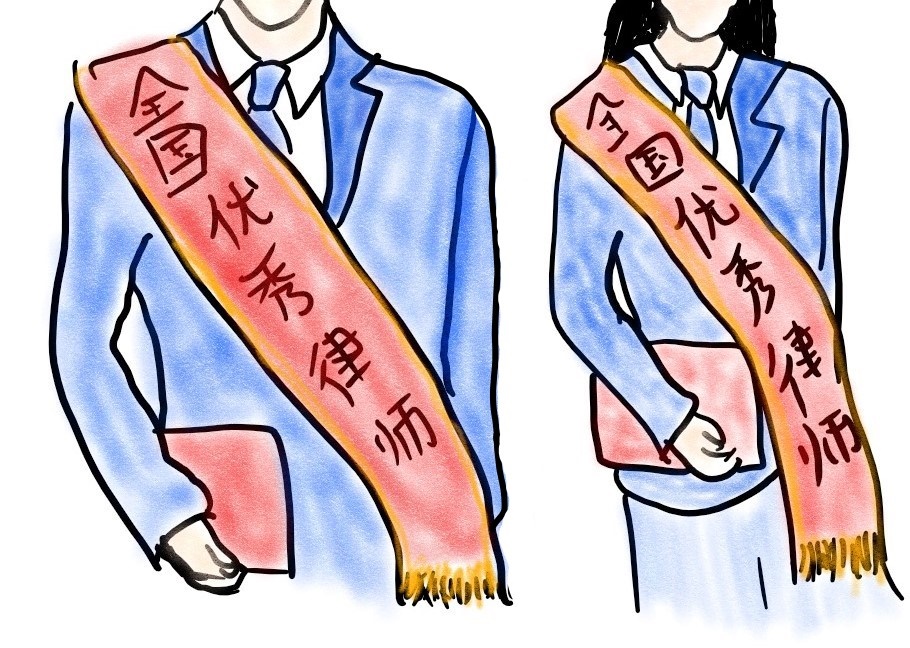A new paper by Lawrence Liu and Rachel Stern

Mr. Zhou* briskly entered the conference room, shook my hand, and apologized for his tardiness. He had just completed an interview with a state-run newspaper and had lost track of time. I thanked him for squeezing me into his busy schedule, and after a bit of small talk, we began our conversation. As with all of our interviewees, I first asked Mr. Zhou whether being selected as a National Outstanding Lawyer by the All China Lawyers Association (ACLA) had an effect on his work or life. Mr. Zhou took this as an opportunity to mention that he has actually won over 400 government awards. In fact, his legal work and ideas for legal reform have even received recognition from Xi Jinping, and Mr. Zhou pulled up his WeChat profile to show off a photo with President Xi in the foreground and him smiling nearby.
Conversations like the one we had with Mr. Zhou reflect an understudied perspective on the relationship between Chinese lawyers and the Chinese government. Much attention has rightly been paid to the brave activist lawyers who have wielded the law as a tool for social change and to the Chinese government’s increasingly repressive response. Showdowns with the state are not the only ways in which Chinese lawyers engage in politics, however.
In “State-Adjacent Professionals: How Chinese Lawyers Participate in Political Life,” we focus on a group of “state-adjacent” lawyers that serve as trusted citizen-partners in governance, specifically the lawyers who have won the ACLA’s National Outstanding Lawyer Award. Our research on the 600-plus lawyers who received the Outstanding Lawyer Award between 2005 and 2014 shows that ACLA’s process typically results in the selection of a well-read, domestically educated male with strong ties to China’s bar association. Limited data on awardees’ party affiliations suggest that Outstanding Lawyers are also more likely to be members of the Chinese Communist Party.
To understand how and why Outstanding Lawyers participate in politics, we also interviewed twenty eight award-winners in four Chinese cities. We document how Outstanding Lawyers draw on their legal expertise to make suggestions to officials, sometimes through institutions such as the People’s Congresses and sometimes more informally, such as sharing opinions with officials over dinner. In addition, lawyers’ professional status helps them convince disgruntled clients to play by the political rules, and to funnel their grievances through the courts rather than protesting outside of them. We argue that this is an important form of political participation, which shows how blurry the line can be between the governors and the governed. What do lawyers get out of this type of political participation, which is often voluntary and unpaid? Although we do not discount the potential monetary and reputational benefits, we find that awardees are committed believers in gradual reform through cooperation with government officials.
Of course, there are also limits to state-sanctioned political participation. Not only are there limits on the types of advocacy lawyers can pursue, but also on who gets to participate. Like many opportunities in contemporary China, well-connected, older men are overrepresented among state-adjacent lawyers.
As the number of Chinese professionals continues to grow, will we see other types of “state-adjacent” professionals? We close with the suggestion that the answer is yes. Multiple types of state-adjacent professionals likely will participate in politics by channeling information to the government and persuading citizens to buy into government priorities.
Find the full paper, published in The China Quaterly and available for free download via open access here.
Lawrence J. Liu is a PhD student in the Jurisprudence and Social Policy Program at Berkeley Law as well as a JD Candidate at Yale Law School. His research interests are in administrative law and regulatory politics, law and globalization, and state-society relations, with a focus on how “law” legitimizes or challenges governance efforts in contemporary China. Follow him on Twitter or contact him at ljliu(at)berkeley.edu.
Rachel E. Stern is a professor of law and political science in the Jurisprudence and Social Policy Program at Berkeley Law, where she currently holds the Fong Chair in China Studies. Her research looks at law in mainland China and Hong Kong, especially the relationship between legal institution building, political space, and professionalization. Follow her on Twitter or contact her at rstern(at)law.berkeley.edu
* Mr. Zhou is a pseudonym for one of our interviewees in Beijing.
